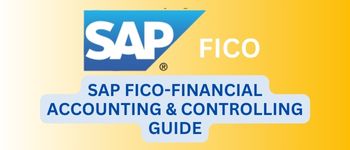SAP FICO
SAP FICO (Financial Accounting and controlling) module.
Are you curious about SAP FICO? In this article, we’ll cover everything you need to know about this module, including its definition, applications, career prospects, and tips for learning.
SAP FICO stands for Financial Accounting & Controlling, which provides a comprehensive financial transaction and business analysis system for organizations of all sizes. Every industry has an accounting module, and SAP FICO helps standardize this process. It has over 20 modules, including sales and distribution, human resources, material management, production planning, and procurement management.
If you’re interested in pursuing a career in SAP FICO, read on to discover its scope and opportunities, as well as the best places to learn it.
What is SAP FICO?
So, SAP FICO handles all the financial accounts, transactions, inventories, and balance sheets. Fico has two main integrated modules, FI-Finance Account and CO-controlling or business accounts. FI has become a module for legal use and mandatory for generating transactions, invoices, profit and losses for external use. Bankers use it, investors, senior management, and income tax for external purposes.
Controlling or internal accounts oversees what profit we have from which products, which region they have significant profit, it provides analysis to the company with complete financial reports, and how the company can grow in terms of monetary.
What is the minimum requirement/skillset/qualifications for FICO?
Any graduates with basic knowledge of accounting such as debits and credits, balance sheets, income statements, and more are necessary. It is also important to be familiar with terms like vendors, customers, inventory, revenue, expenses, cost centers, profit, assets, and more.
Accounting background: B.Com, M.Com, MBA Finance, CA intern, CMA.
Working professionals: Accountants, Chartered Accountants.
SAP has two primary working domains: SAP consultant or SAP end-user.
If a company implements SAP for complete implementation, maintenance, rectification, and modification, SAP consultants help the company with these changes. End-users are those who use the software or application and have complete knowledge of how it works. A fresher should start as an end-user and, after gaining enough experience, move towards the consultant level if interested in this field of work.
What are the scope and career opportunities in SAP FICO?
SAP FICO offers excellent compensation and a good salary package. Here is a list of its salaries based on experience:
For Consultants:
- Associate level (0-1 year of experience): 5-7 lakhs per annum
- Consultant level (4-5 years of experience): 10-15 lakhs per annum
- Senior consultant level (5-10 years of experience): 15-20 lakhs per annum
- Manager, senior manager (10-20 years of experience): 20-45 lakhs per annum
- Leadership role level (20+ years of experience): 75 lakhs or more per annum
For End Users:
- Fresher level (0-1 years of experience): 3-5 lakhs per annum
- Intermediate level (4-5 years of experience): 10 lakhs per annum
- High level (12-15 years of experience): 15-20 lakhs per annum
- Advanced level (20+ years of experience): 20 lakhs or more per annum
Becoming an SAP consultant commands respect in the industry. At the consultant level, there will be opportunities to travel to different countries and a lot to learn.
How and where to learn?
SAP FICO can be learned from various training centers. It can also be learned online, which provides many SAP-related courses, videos, and tutorials. Fees for SAP FICO training from an institution may vary from 15,000 to 50,000 for end-users. For consultants, it may range from 50,000 to 3 lakhs depending on the organization and institution.
Is Certification Mandatory?
What to do after learning SAP?
For a fresher, it may not be possible to secure a job immediately after completing SAP training, but it can still enhance your resume. It is important to continue practicing and learning to stay updated with the program. Finding a job as a fresher can be challenging, but it is recommended to apply to companies regardless of the salary, and after gaining experience, apply to larger companies.
Freshers may also have a chance to secure a job with a good package if they have references or if there is an urgent need for SAP candidates in the company. It is advisable to work in other sectors until finding an SAP-related job. Individuals with accounting sector experience may have a higher chance of securing a job in a company.



